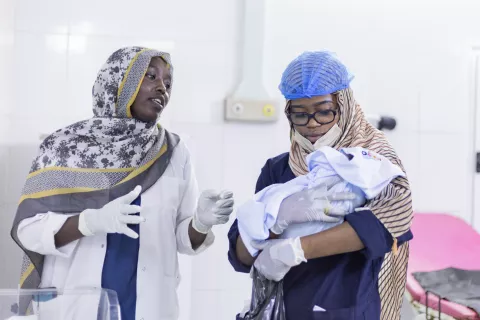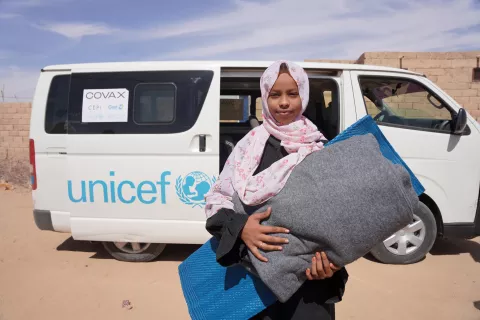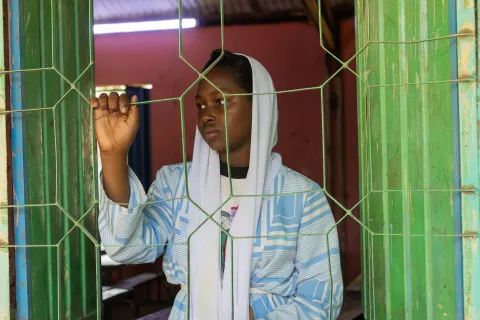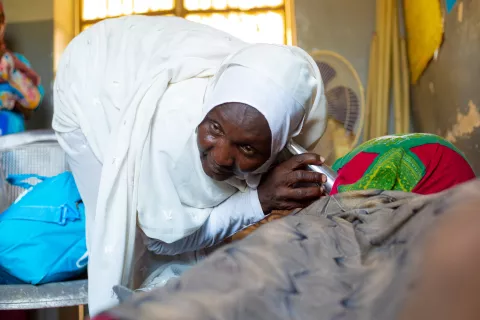How the Mother and Child Cash Transfers programme empowers women in East Sudan
Women in Al-Lalaloba, Red Sea state applaud the MCCT+ programme

- Available in:
- English
- العربية
Mahasin Mohamed Al-Rayih is a 26-year-old mother who splits her time between Suakin, a port city on the west coast of the Red Sea and Al-Lalaloba, a rural district in the North-Western part of Port Sudan city.
In May 2021, she found out about the Mother and Child Cash Transfers (MCCT+) programme when visiting the center.
Red Sea state, one of the poorest states in Sudan, is one of the sites of the MCCT+ programme which is a multi-year programme that provides cash grants to pregnant women and children under two years of age.
The aim of the program is to support the first thousand days of a child’s life and promote women's health by providing care services for pregnant, and lactating women: and building the capacity of midwives in rural and urban areas. The programme is piling on UNICEF’s integrated approach by promoting safe health and nutrition practices among beneficiaries and extending WASH services to targeted communities.
Mahasin who was heavily pregnant at the time managed to register at Al-Lalaloba health center before she gave birth to Husam, her first-born who is now 5 months old.
“The support I received was wholesome. They taught me how to develop a delivery plan and I used the fund to buy essentials for myself and the baby. I bought food and milk that is critical for lactation,” said Mahasin.
Al-Lalaloba health center lies in the low-income neighborhood of Al-Lalaloba. Many of the women in the neighborhood are unemployed or rely on daily wages as domestic servants as many dropped out of school due to poverty and child marriage. Their husbands have sporadic employment at the Sea Port or take on other menial jobs.

“Some women don’t have enough food for their families, and some can’t even afford to get a taxi to travel to a nearby hospital to give birth,” said Mahasin.
Mahasin is due to receive her second payment soon and it is coming at a perfect time.
“My son will require food soon, this support will help me purchase healthy and diverse food items for my son,” she added.
Mazia Salih Baraka is an assistant midwife at the locality and supervises health centers in three locations, Al-Laloba, Alexandria and Al-Shagar.
In April 2021, she was trained by UNICEF on the MCCT+ programme and in May 2021, her team began to spread the word about the programme through neighborhood visits and sharing information to mothers coming to pre-natal visits.
“The programme aims to empower women through multiple ways; ensuring that they attend regular pre-natal visits, to help them develop a delivery plan and organize their priorities to better utilize the funds,” said Mazia.
A delivery plan helps women allocate money for an emergency hospital visit, to monitor their situation to figure out if their birth will be natural or through a c-section, to prepare a well-organized delivery bag and to arrange childcare for their other children in advance.
Zainab Karrar is 22-years and pregnant. She was married off at a young age and has three children.
“I came to the center for a pre-natal check-up and Mazia told me about the 1,000 days programme, I registered and received the first payment in September. I used it to buy food such as meat and fruits for myself and my children,” said Zainab.
Zainab is not working, and her husband doesn’t have a stable income.
“We can’t always afford to eat well, our food depends on the daily income my husband makes,” said Zainab.
Mazia speaks to pregnant women such as Zainab and others. She makes sure they understand that this support is meant for them and their children.
“I want to make sure they have access to better food, most of them are pregnant and have anemia, they need to get better to be able to breastfeed. I want them to buy any medicine they couldn’t previously afford or had to de-prioritize,” said Mazia.
Amal Mohamed is a 22-year-old mother and is currently in her third trimester.
“I received the support from the programme and used it to buy items for my delivery bag, I am now waiting for the second installment which I will save for my delivery,” said Mohamed.
Amal faced difficulties during her last delivery, which is making her anxious, but this time she wants to be ready.
“I will save this money because I need to have a back-up plan if I struggle during delivery again. I need to have money to go to the hospital,” said Amal.

As a result of the programme, Mazia is seeing more pregnant women arriving at the center to access services. She even began seeing women she didn’t see before at the center.
“Beforehand, we used to receive 15 to 20 pregnant women a month, now the numbers are in the hundreds and we are seeing women coming for post-natal care as well,” said Mazia.
As we sat with Mazia, Khadija Ahmed entered the center for a check-up for her son.
Khadija, one of the participants in the MCCT programme, is a mother of five. Her youngest son is 4 months old, and she wants to check his weight and health.
Ishraqa Ibrahim, a nutrition supervisor, examines the baby and weighs him.
“We do the measurements and check the weight; we give the baby the needed vitamins and supplements to prevent any level of malnutrition. We do this work inside the center and we also do house visits to increase our reach,” said Ishraqa.
The team also advises mothers to focus on exclusive breastfeeding in the first six months.
Every week, each center volunteer conducts 25 house visits ensuring that 125 houses in total are covered by the 5 volunteers.
Mazia who supervises the midwives in the central sector of the locality has also benefited from the programme.
“I have built my capacity due to the programme and received a lot of new information. I was also given masks, sanitizers and a lot of protection equipment for myself and my patients,” said Mazia.
The MCCT+ programme is currently being implemented in Kassala State and Red Sea State in partnership with government entities. To date, MCCT+ has registered more than 50,000 pregnant women and 13,000 beneficiaries had received their cash entitlements in 2021.




